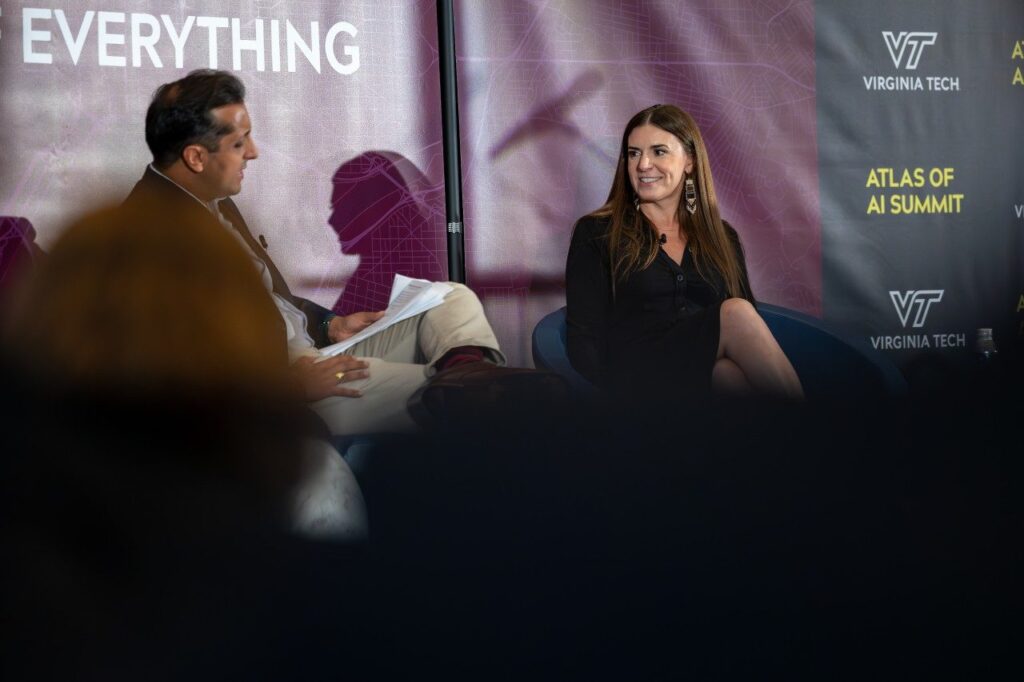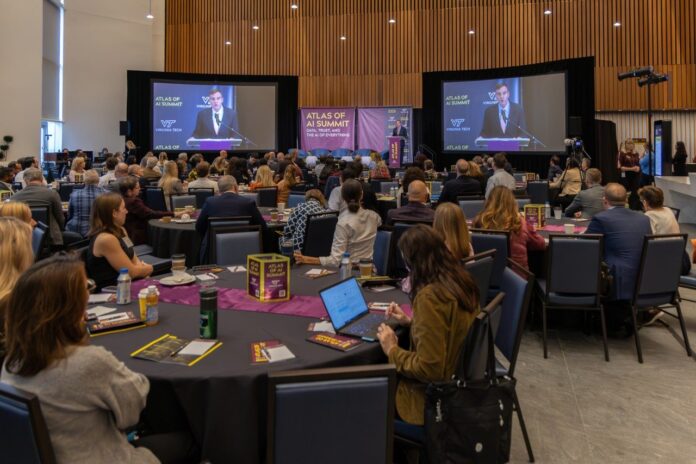As artificial intelligence (AI) proliferates into every area of our lives, there is no road map for what to expect over the next several years. But how best to navigate the path ahead rests at the intersection of industry, government, and higher education, especially in the greater Washington, D.C., metro area.
That was a major impetus for Virginia Tech to gather the Atlas of AI Summit: Data, Trust, and the AI of Everything, at the Capital One Hall in Tysons on Sept. 27.
“We’re less than 24 months into this AI-ascendant era,” said Rishi Jaitly, founder and leader of Virginia Tech’s Institute for Leadership in Technology, who emceed the event. “It’s time to kind of take a step back and, as this summit’s title indicates, develop an atlas or a map, take stock of the entire ecosystem. How have the last 24 months been and how might the next 24 years go?”
Answering the big questions around what AI looks like now and in the future will require creative partnerships between these pillars of higher education, industry, and government. The summit itself, supported by Virginia Tech’s Innovation and Partnerships and the Office of Research and Innovation, was an example of this kind of cooperation in action, featuring leaders from around Virginia Tech alongside business leaders from Capital One, AWS, OpenAI, Deloitte, NVIDIA, The Washington Post, and others as well as representatives from the U.S. Army, the IRS, and state and national elected officials. The summit also featured Ted Talk-style presentations, including one from Yi Yeng, a Virginia Tech Ph.D. student whose work on AI guardrails was featured in The New York Times.
“I know that we’ve got to get it right — that’s why these forums are so terribly important,” said U.S. Sen. Mark Warner, D-VA, who delivered the charge for the day. “Part of the challenge for the day is thinking this through in a way that’s moving at a technology speed that’s really greater than anything in my lifetime.”
Warner also stressed the need for the United States to take the lead in developing regulatory frameworks around the new technology. “We’ve got to make sure on AI we reengage on standard setting on an international basis,” he said. “NIST [National Institute of Standards and Technology] is going to play an extraordinarily important role.”
VIDEO: https://video.vt.edu/id/1_tzxv4shr
“If you are prepared to accept the premise that AI is going to substantially change the nature of work — and in my view, that’s an established premise — then you have to understand that universities such as ours have to integrate through an entire curriculum, across all student experiences, the skills and the knowledge necessary to live and be productive in a world of AI,” said Clarke.
The connection from higher education through industry and government is already present in the Virginia Tech graduates working in both arenas, several of whom took part in panels at the summit. Ray Hensberger ’06, the global head of AI of Amazon AWS, gave his perspective on “Data and Decisions.” Christina McClung ’03, senior vice president of human resources for Capital One, discussed the importance of “Work Ready AI Talent.” Kevin Lane ’95, M.S. ’00, principal at Deloitte, spoke on “The AI of Everything.” Randy Soper ’94, M.S. ’95, chief of AI for the Internal Revenue Service, tackled issues presented on the “Trust and Assurance” panel.

Meanwhile, Sarah Franklin ’97, CEO of Lattice, joined Jaitly for a discussion on “Navigating the Next: A Dialogue about the Business of People.” As two people with tech backgrounds currently working on the more human side of the business, they’re both in the middle of drawing these road maps to figure out how humans and AI will work together as the technology evolves.
“The skills that are most important are things like the curiosity, the drive, the ability to communicate your thoughts, to communicate and collaborate with others,” said Franklin.
Friday’s summit offered a platform for mobilizing a diversity of leaders, all intersecting with AI in some way, to hear and learn from one another about both the challenges unfolding and the immense opportunities ahead.
“We have a unique ability to bring people in — both Hokies and people in the Washington area and from beyond — to speak candidly, vulnerably, and with vision as well on these issues,” said Jaitly. “And I think we took advantage of that today.”
Closing the summit, Laura Belmonte, dean of the College of Liberal Arts and Human Sciences, offered a final consideration about how we integrate AI into our lives.
“As we build the atlas of AI, let us never lose sight of the empathy, integrity, and community that must guide us if we are to end up someplace we want to be,” she said.
By Noah Frank

